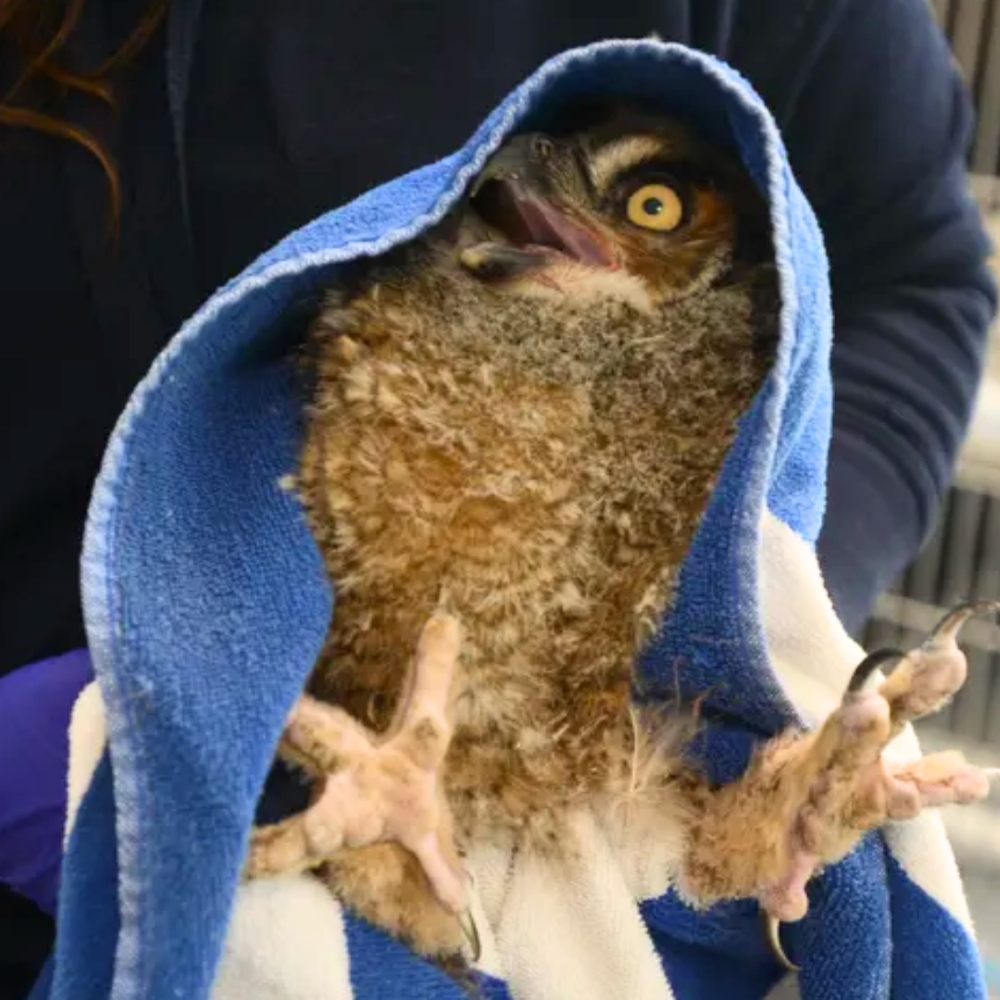The great horned owlet pictured here was orphaned by highly toxic chemicals pest management professionals and homeowners use to target rats and other rodents.
Second-generation anticoagulant rodenticides, or SGARs, were developed in the 1970s as a more potent successor to the previous generation of anticoagulant rodenticides, including warfarin. Rodents can consume a lethal dose of SGARs in a single night of feeding but generally do not succumb to the effects before 5-7 days.
During this time, the exposed animal can walk around in an impaired state and become easy prey for one of the many species of wildlife in Plymouth that use rodents as the foundation of their diet. As a result, the poisons’ effects spread throughout the food chain. Since predators will consume hundreds or thousands of rodents annually, these chemicals can bioaccumulate in their tissues – leading them to eventually bleed out after suffering a seemingly benign injury like a cough, scratch, or sneeze. This is what happened to the owlet’s parents and two siblings.
The US Environmental Protection Agency created several restrictions on the use of these chemicals in 2015, after receiving tens of thousands of accidental poisoning reports annually during the 1990s and 2000s, affecting children under age three. However, these restrictions have not stopped the regular injection of these poisons into our communities by licensed pest management professionals.
For example, a 2020 by Tufts University found that 100 percent of red-tailed hawks treated at Tufts Wildlife Clinic from 2018 to 2019 had SGARs in their tissue. These findings are not surprising when pest management professionals operating in the Commonwealth applied over 250 tons of SGARs in 2022 alone, according to the Massachusetts Department of Agricultural Resources.
The staggering amount of poisons introduced into our communities and local ecosystems has done nothing to arrest the number of rodent complaints experienced in towns and cities throughout the Commonwealth. Moreover, no data or peer-reviewed study supports the claim that these chemicals affect rodent populations in areas where they are applied. By extension, no data supports the claim that these chemicals protect public health better than non-poison alternatives.
Several cities and towns, including Brookline, Newton, Cambridge, Somerville, Newbury, and Arlington, have shifted away from SGARs and other rodenticides in favor of poison-free tactics, such as electronic traps, improved waste management programs, rodent exclusion, and rodent prevention. Some have even enacted policies and bylaws restricting the use of SGARs on public and private property in emergencies, as verified by their boards of health.
In Plymouth, rodent complaints have steadily increased since 2022. According to the Department of Health, Plymouth received 12 rodent complaints in 2022 and 14 in 2023. Although we’re currently on pace for 16 in 2024, these numbers are significantly below the levels of other cities and towns that have already taken steps to reduce the amount of SGARs applied in their jurisdictions.
Yet in Plymouth, we have seven bait boxes around Town Hall alone. These boxes had labels on them indicating the presence of multiple products containing SGARs. However, many labels have been removed since we met with the Plymouth Board of Health on April 10. Accordingly, there is no way for members of the public to know what’s in those ominous black boxes.
Plymouth deserves a more responsible pest management strategy that does not rely on highly toxic chemicals with no verifiable benefits and well-documented costs to public health and biodiversity.
Rescue Plymouth Wildlife is a fiscally sponsored project of Mission Earth, a 501 (c) (3) organization. We’re committed to working with the town to develop a more responsible pest management strategy. Plymouth deserves a pest management strategy that does not rely on highly toxic chemicals, which have no verifiable benefits and well-documented costs to public health and biodiversity. Folks can visit our website to learn more about this issue and how they can help.
Will Fitzgerald
Fitzgerald is the founder of Rescue Plymouth Wildlife.

